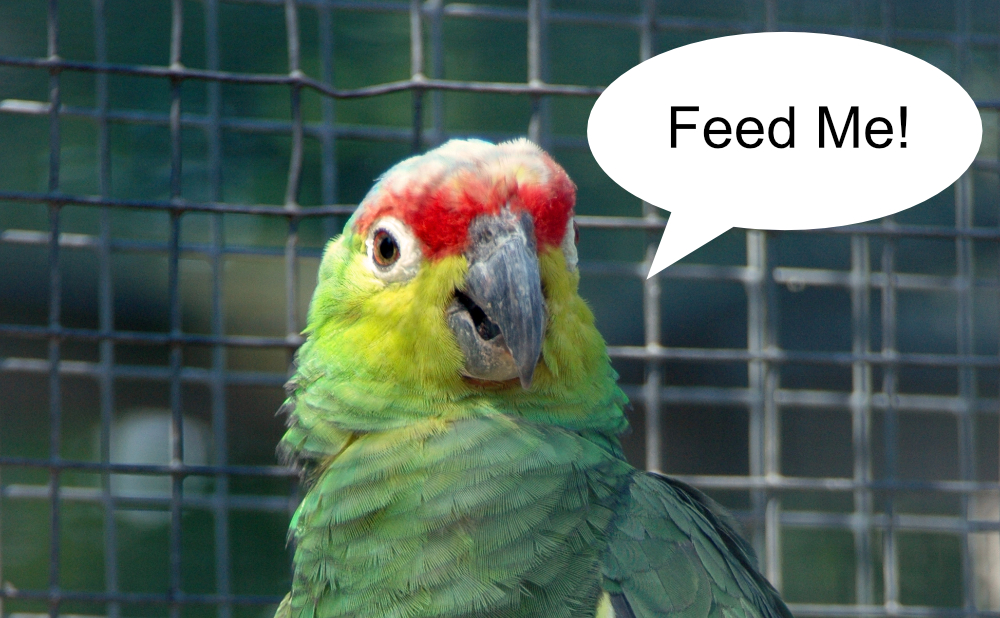Diet and feeding

Warning!
NEVER give your parrot:
- Chocolate, coffee, and cocoa contain “theobromine” that is poisonous for birds!
- Avocado is poisonous – especially for African breeds!
- Avoid raw potatoes, rhubarb, augergine, olives, asparagus.
- Avoid coffein (coffee, cola) and alcohol.
Be careful with:
- Peanuts may be affected by fungus (aspergillus) . I recommend using hazelnuts, walnut, almonds or pine nuts as snacks instead.
- Milk products can not be digested properly and may after some time cause digestive problems
- Also salt can not be digested properly – avoid chips or anything else with much salt.
What is a healthy diet?
Many pet parrots is restricted to a diet based on mostly seeds but also some fruit and vegetables. Wild birds have access to a wide variety of seeds, fruit, berries, roots, vegetables, insects etc. that can provide the necessary proteins, vitamins and minerals for a healthy diet.
An all-seed diet cannot provide the parrot with all the vitamins and minerals they require as seeds are deficient in calcium and vitamins. Seeds contain a lot of fat and often parrots are very picky and prefer eating only the more fatty sunflower seeds which in the long run can lead to health issues. The seed mixes sold for pets are usually of a very low quality. A diet primarily based on seeds will lead to malnutrition and a shortened lifespan.
Formulated diets or “Pellets” however contains a healthy mix of ingredients that provides all the vitamins and minerals your bird require. Many breeders recommend using pellets as the major part of the daily diet. I personally prefer using Zupreem pellets but you may try other high quality pellets as parrots can be picky about taste and may prefer another brand e.g. Harrison’s, Kaytee, Pretty Bird or Roudybush.
Should I only use pellets then?
While some breeders are sort of religious about pellets and go all in, I personally believe that a healthy diet should be based on a healthy mix of different food sources (sort of like wild birds have access to a wide variety).
- Pellets should be the main ingredient (50-60%) of the daily diet
- Add a small amount of seeds (like 5-10%) for variation – only buy premium quality seeds
- Add a mix of different nuts (but avoid peanuts!) as they are high on Omega 3 fatty acids and also minerals (e.g. selenium, manganese) and antioxidants
- Also serve some fruit and vegetables (see below).
- Sprouts are highly recommended – especially during breeding time.
Sprouts are a healthy food addition for all birds and is especially recommended for the feeding hen and the young birds. Sprouted seeds are high in vegetable proteins, vitamins, minerals, enzymes, and chlorophyll. Sprouts are low on fat as the fat stored in the seeds are used to start the growing process.
Converting your bird to a new diet
When a bird is used to only eating seeds it can be difficult to convert them to eating pellets instead. Here are a few hints to how you may convert your bird to pellets:
- Experiment with different kinds of pellets – check if your local pet store sell small samples of different types. Parrots can be very picky about what they like so they may prefer one kind of pellets over another.
- Start by adding a few pellets to the seed mix so they can get used to the smell and taste.
You can also grind a few pellets and sprinkle it over the seeds or over a favorite threat. - Let the bird see you eat a few pellets and then hand feed it to the bird – pet birds often like to eat the same food as its owner.
- Try moistening a few pellets with water or a little juice – remove the pellets after a few hours if not eaten to avoid spoilage.
- Replace a small percentage of the daily seeds with pellets – after some time increase the percentage of pellets and decrease seeds in the daily food.
Bird-safe food
Fruit & Berries
Vegetables
Nuts
- Apples
- Apricots
- Bananas
- Berries
- Cantaloupe
- Cherries
- Cranberries
- Currant
- Gooseberries
- Grapefruit
- Grapes
- Kiwi
- Mango
- Nectarines
- Oranges
- Papaya
- Peaches
- Pears
- Pineapple
- Pomegranates
- Tangerines
- Broccoli
- Carrots
- Cauliflower
- Celery
- Collard
- Corn
- Cucumber
- Eggplant
- Ginger
- Kale
- Lettuce
- Parsley
- Parsnip
- Peas
- Squash
- Sugar snap
- Sweet potatoes
- Sweet peppers
- Almonds
- Brazil nuts
- Hazelnuts
- Pecans
- Pine nuts
- Pistachios
- Walnuts
You can also give greens from:
- Beet
- Carrot
- Dandelion
- Mustard
- Turnip
WARNING:
DO NOT serve avocado, raw potatoes, rhubarb, aubergine, olives, asparagus to your parrot!
You may feed boiled potates or mashed potatoes with chopped vegetables but avoid giving raw potates!
